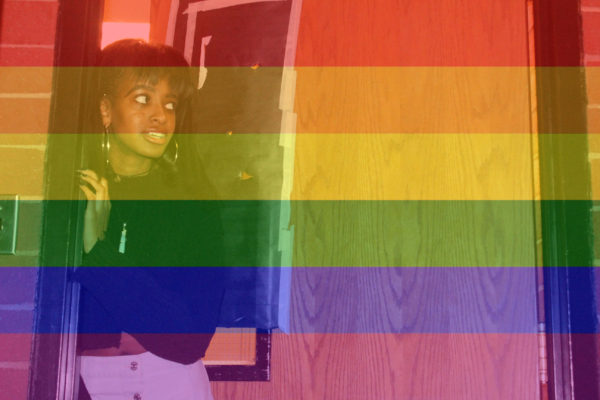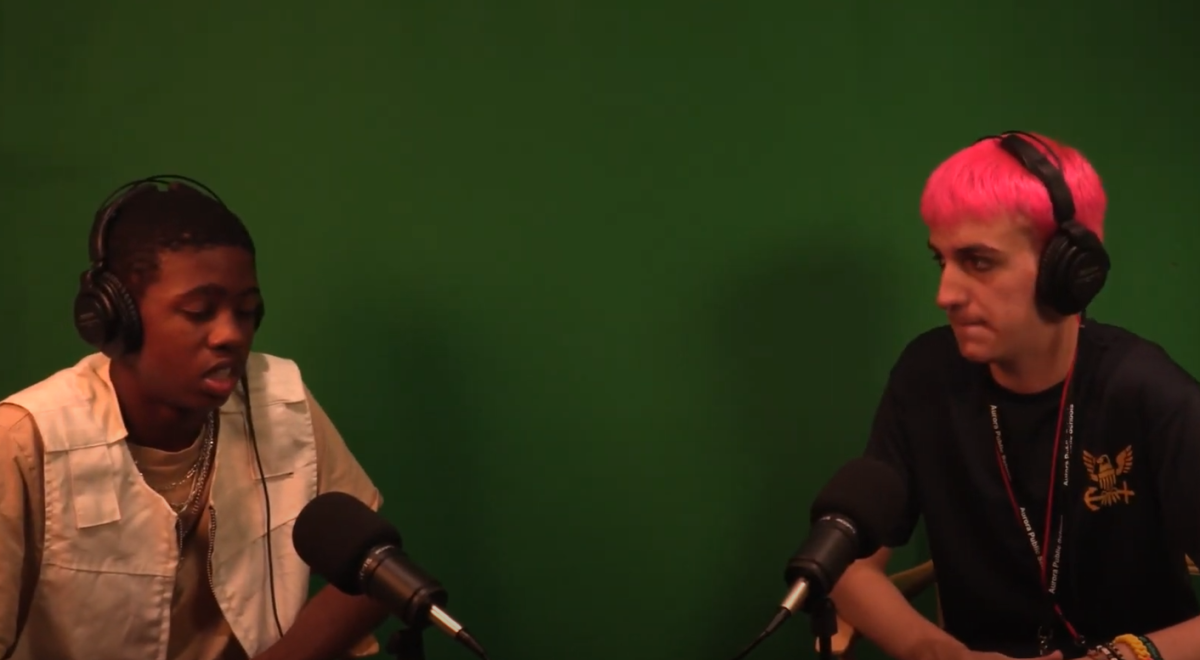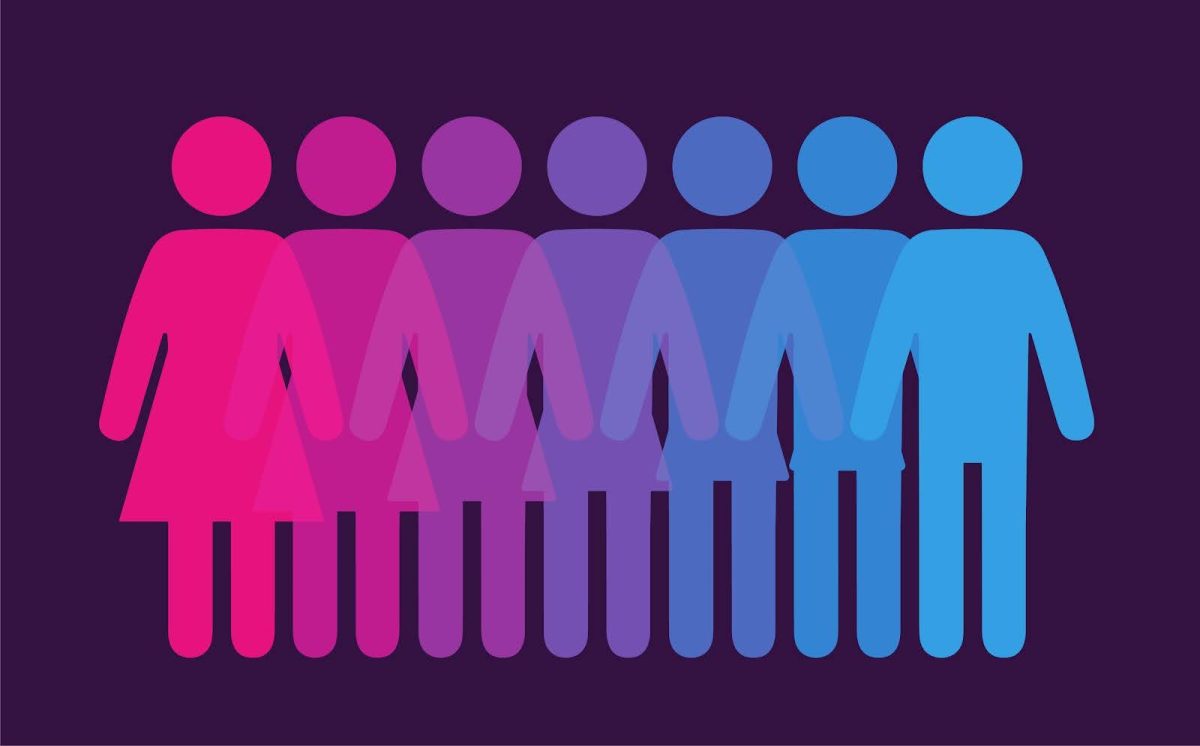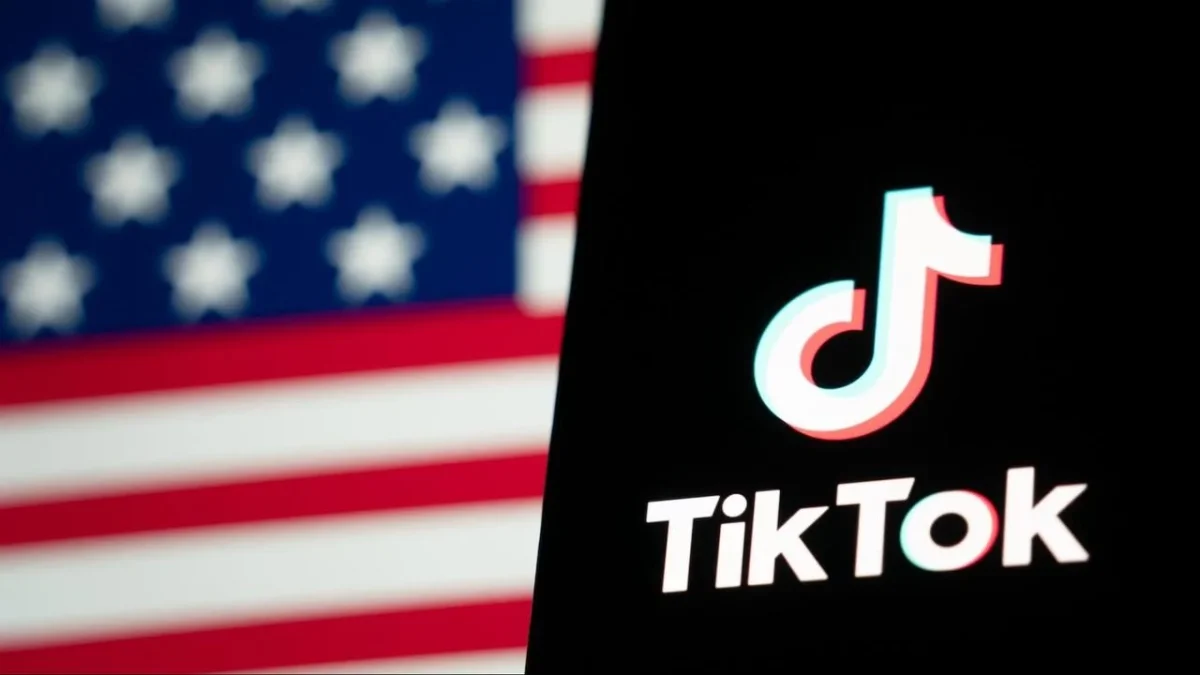Feature Photo By: Connor Rodenbeck – Senior Showiet Perry comes out of the closet in this posed picture. Many students struggle with feeling comfortable enough to express their sexuality, but Rangeview has made it easier to come out.
At the end of October, Rangeview High School’s theater department put on The Laramie Project, a show about the brutal murder of a gay man in Laramie, Wyoming. As I watched, teary-eyed, I was perplexed at how people could possess such hatred for someone so innocent.
When I left the auditorium that night, I wondered what life is like for teenagers in the LGBTQ+ community today. With all of the controversy surrounding the Trump Administration’s clear disapproval of this community, do people who identify as a different sexual orientation than straight feel safe in this country?
President Trump’s recent decision to ban transgender people from the military, as well as his blatant refusal to acknowledge June as LGBT pride month, have been viewed as acts of oppression by many in the LGBTQ+ community.
According to The Washington Post, Trump is gearing his interest towards those who voted him in, which are primarily conservative Christians whose beliefs do not typically align with inclusivity of people of differing sexual orientation.
Regardless of Trump’s focus on the evangelical vote that got him in office, there is still clear oppression amongst the LGBTQ+ community, even in modern times.
For example, there is a case that was just brought to the Supreme Court involving perceived discrimination against same-sex marriages. In the case Masterpiece Cakeshop, Ltd. v. Colorado Civil Rights Commission, a cake shop owner refused service to a gay couple based on religious beliefs. The case was heard on Tuesday, December 5th and is a perfect example of the continual strife that the LGBTQ+ faces.
I was primarily interested in the LGBTQ+ youth in the United States. According to the Trevor Project, LGB (lesbian, gay, bisexual) youth are five times more likely to have attempted suicide compared to heterosexual youth. Additionally, 40% of transgender adults report that they made a suicide attempt, 92% of which were before the age of 25.
Even worse, it is reported that each episode of LGBT victimization — which includes physical or verbal harassment or abuse — increases the likelihood of a teen self-harming by 2.5 times on average.

The statistics indicate that LGBTQ+ youth are feeling marginalized, unsafe, and oppressed. However, I wanted to get a better look into the community’s presence at Rangeview High School.
There are a large number of people that identify as a sexual orientation other than straight at Rangeview. Many are out and open about their sexual orientation; many still feel uncomfortable with sharing it publicly. Despite this, the general consensus among those interviewed was that Rangeview is fairly inclusive and accepting, allowing those in the LGBTQ+ community to feel welcome.
“Rangeview, as far as I have seen, has not discriminated against the LGBTQ+ community and has always made them feel like everyone else,” says sophomore Sheldon Lucas-McHenry, who is openly gay.
Sheldon is someone who advocates for the LGBTQ+ community and is always trying to help those who are confused or dismayed by their situation involving their sexual orientation.
One of the reasons that the LGBTQ+ community feels so included at Rangeview is the Gay-Straight Alliance (GSA). Meeting every other Tuesday, it is a safe place for students of any sexual orientation to convene.
Kyle Hirsch, Rangeview counselor and sponsor of GSA, says that it was an easy decision to take over sponsorship of the club. He states that he believes that GSA provides “a safe, fun space for students to be themselves and not worry about the judgment of others.”
Freshmen Emanuelle Bonsu stated that GSA has been integral in making sure that she feels accepted here at Rangeview, even though it is her first year.
“GSA is basically everyone that isn’t straight in the room,” states Bonsu. “But, it’s really fun, very welcoming and you’re not alone in there. There are people that are just like you.”
I wanted to get the student perspective on the issue. I also thought that I needed to get insight from an adult who can relate to the same problems LGBTQ+ students face today.
Dawn Weber, English teacher and former Rangeview student, is openly out as a member of the LGBT community. She has a wife, a couple of kids and has expressed her dislike of labels on people. Due to this, I will not label her as a lesbian or gay person.
Weber discussed how Rangeview has never been a place where discrimination of the LGBT community has been overly severe and present. She did say, however, that things have definitely gotten better at Rangeview.
“I think it’s really powerful that kids today can express those kinds of emotions and feelings earlier on without feeling that they have to repress them for any reason,” Weber states.

When asked if she ever heard discriminatory remarks like “gay” or faggot” circulated through the halls, she speculated that students simply do not understand the meaning of the words and that the more people use them, the more power the words have.
Perhaps most students don’t intend to use the words maliciously. Nonetheless, there are likely many who still anguish over coming out or being ridiculed for their sexual orientation. Hearing the aforementioned phrases just tossed around is unacceptable and hurtful.
Another student, senior Showiet Perry, also believes that Rangeview is very accepting of her community; however, she also thinks that Rangeview has some work to do in terms of generating positive change for the LGBTQ+ community.
“I think that we just need to focus on educating people who don’t understand because most of the time, most of the people who are homophobic or against certain sexualities are usually just not educated,” Perry says.
She has a good point: lots of people–attending Rangeview and in general society– are not properly educated on sexual orientation. Perhaps they are influenced by their religious affiliation, or perhaps they just aren’t as open-minded as others. Either way, it would be beneficial if everyone was educated on how sexual orientation is inherent and not a choice a person makes.
The positive experiences of those interviewed do not diminish the negative experiences some students endure during their time in high school.
That being said, it seems that Rangeview’s diversity has always lent itself to a positive atmosphere where people feel accepted. Just as other minority groups are included, the LGBTQ+ community is not frequently discriminated against.
“The acceptance, the diversity, the willingness to allow people to explore, is one of the, quite honestly, the finest thing that makes up the fabric of who Rangeview High School is,” Weber wisely states.
There is still work to be done for the LGBTQ+ community, but Rangeview is definitely a place where love trumps hate.






